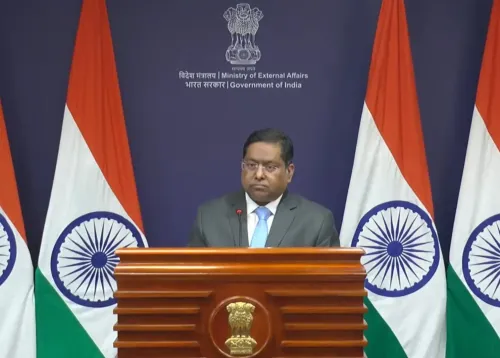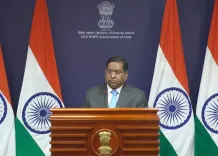What Does the Promotion of Field Marshal Asim Munir Mean for Pakistan?

Synopsis
Key Takeaways
- Field Marshal title serves as a consolidation of military power.
- Significant implications for civil-military relations.
- Potential shift towards authoritarianism in governance.
- Historical parallels to General Ayub Khan's military rule.
- Economic challenges complicate the political landscape.
New Delhi, June 3 (NationPress) In a move that has raised alarm across Pakistan's social fabric, the federal government, led by Shahbaz Sharif, has recently conferred the rank of Field Marshal—the highest military honor in the nation—upon General Asim Munir, the Chief of Army Staff.
This decision, framed as recognition for his “exceptional leadership” during the latest military tensions with India, has ignited a considerable discussion about the evolving dynamics of civil-military relations in Pakistan. It also highlights the military's growing dominance over democratic institutions that have historically functioned under military oversight.
This is only the second time in Pakistan's nearly 80-year history that such an honor has been awarded to a military leader. The first instance occurred in 1959 when General Ayub Khan was granted the title and later ruled as a military dictator for more than a decade. The resonances of this comparison, although not openly stated, are both striking and telling.
General Munir's ascent to Field Marshal follows heightened military tensions stemming from Operation Sindoor, initiated by the Indian Armed Forces in retaliation for the deaths of 26 tourists in Jammu and Kashmir on April 22, attributed to terrorists linked to Lashkar-e-Toiba.
While statements from Islamabad hailed the operation as a strategic success that thwarted Indian “aggression,” reports indicate a more complex reality. Notably, Indian forces not only targeted terrorist infrastructure but also expanded their operations to strike at least nine Pakistan Air Force (PAF) bases and other military assets, including air defense systems in urban areas like Lahore.
At least three airbases, including Rafiqui, suffered significant damage and became non-functional.
The official narrative from the Pakistan military emphasizes themes of restraint, readiness, and strategic deterrence. This portrayal aims to transform a period of vulnerability into one of strength. The awarding of the Field Marshal rank to General Munir is positioned as a critical component of this narrative by military leadership, seeking to unify Pakistan behind its armed forces and project an image of institutional strength during a time of rising internal dissent and questioning of the legitimacy of both military and civilian governments, especially following electoral controversies.
The importance of General Munir's elevation goes beyond mere ceremonial acknowledgment. In Pakistan, where the military has traditionally been the main arbiter of political power, such appointments often hold substantial implications. This promotion signifies the ongoing consolidation of military dominance over crucial state institutions. The military establishment has placed numerous retired and active officers in leadership roles across various civilian agencies, such as NADRA (National Database and Registration Authority), WAPDA (Water and Power Development Authority), and SUPARCO (Pakistan Space & Upper Atmosphere Research Commission). The blurring lines between civilian and military jurisdictions have become a hallmark of Pakistan's governance. Thus, General Munir's promotion is not only a recognition of his “wartime” leadership but also a clear indication that the military aims to maintain or enhance its grip on the nation’s political landscape.
The Army's drive for this symbolic consolidation of power is partly a response to its declining public image in recent years. Once regarded as the sole guardian of order and stability in a tumultuous political climate, the Army's overt involvement in political maneuvering has faced increasing scrutiny.
A pivotal moment came with the removal and subsequent imprisonment of former Prime Minister Imran Khan. Initially viewed as the military's chosen candidate, Khan's administration strained relations with military leaders, leading to his ousting through a no-confidence vote in 2022, widely believed to have been orchestrated by military leadership. His later arrest and the crackdown on his supporters drew widespread condemnation both domestically and internationally, undermining the Army's carefully cultivated image as an unbiased protector of national interests.
In this context, the conferment of the Field Marshal title aims to restore lost legitimacy. General Munir is depicted not merely as a military strategist but as a unifying national figure who has reinstated Pakistan’s strategic balance amid Indian threats and preserved national unity during domestic upheavals.
However, such symbolism has significant ramifications. The current civilian government, largely seen as a product of military-supported elections in 2024, has shown little resistance to this power concentration. As a result, Pakistan is perilously close to overt authoritarianism. This period is distinct from prior military regimes due to the façade of civilian governance that bestows democratic legitimacy upon what is essentially a military-controlled governmental structure. Within this framework, the Field Marshal title is not merely ceremonial but a crowning symbol of an increasingly centralized power system, allowing minimal room for institutional independence or democratic accountability in Pakistan.
Moreover, this display of confidence should also be interpreted as a veil for underlying vulnerabilities amidst the ongoing economic crisis and security challenges that Pakistan faces. The currency continues to depreciate, inflation remains high, and the nation depends heavily on IMF bailouts and financial support from allies like China and Saudi Arabia.
The legacy of Field Marshal Ayub Khan still looms large. His tenure was marked by centralization, suppression of dissent, and a disastrous conflict with India in 1965. The Pakistani establishment may be harkening back to the memory of strong leadership, even at the cost of institutional stagnation. More critically, this development diverts attention from an essential question: Who holds the military accountable in Pakistan? In democracies, even generals in wartime face scrutiny from elected officials. However, in Pakistan, where the Army operates largely as a state within a state, such oversight remains largely unachievable.
Pakistan stands at a critical juncture, and General Asim Munir's promotion to Field Marshal embodies a broader political trend where civilian institutions are increasingly subordinated to military authority, compromising democratic aspirations in favor of alleged security needs.
In the short term, this action may effectively project a sense of unity and strength. Nevertheless, in the long run, the concentration of power in unelected hands rarely bodes well for institutional evolution or political stability. As Pakistan grapples with economic challenges, insurgent threats, and the intricacies of a multipolar global landscape, its most pressing challenge may not come from external foes but from within: the erosion of democratic ideals and the deepening entrenchment of military power.










